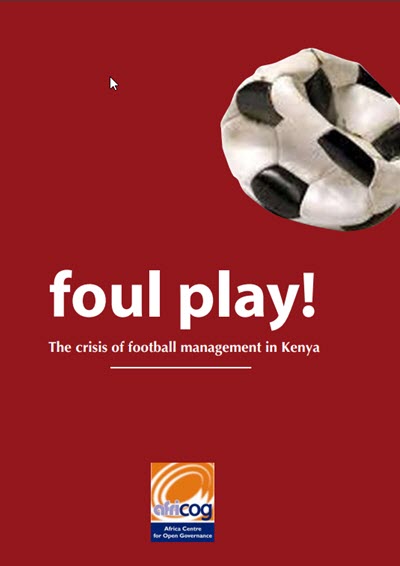Sports is widely recognised as a sector with immense economic value. Over and above the economic potential are the socio-political benefits of sports for reconciliation and as a carrier for positive messages on issues such as corruption and HIV/Aids for the youth and society as a whole.
While Kenya is well known as a sporting nation, this success is not reflected in the football sector, which has been particularly prone to squabbling and corruption.
Corruption in sports is not new. There are concerns the world over about the lack of transparency and accountability in sports and the resultant social and economic impact. The risk of corruption has increased dramatically as commercial influences grow1.
The vast sums of money the industry attracts and the high and public profile of key participants in sports makes it particularly prone to financial misappropriation and other governance issues.
Mega sporting events such as the World Cup 2010 bring to light endemic corruption in the global management structures of football. A 2010 publication by the Institute for Security Studies accuses FIFA2 leaders of “creating an organisation that goes out of its way to avoid financial scrutiny” and goes on to illustrate how FIFA actively resists transparency, making football a fertile ground for corruption. The level of estimated profits that FIFA can expect from the first World Cup on African soil have been estimated at between US$ 3.2 and 4 billion, this does not include the expected revenues from television, marketing, hospitality and licensing which go to FIFA and its local organising committee3.
In the last decade, Kenya’s football administration has drawn significant negative global interest as a result of poor governance and corruption. Public wrangles for power, widespread mismanagement, ethnic antagonism and political intrigue have typified football in Kenya, leaving many industry players and the public disillusioned. More importantly, corruption and negligence in the management of football robs Kenya’s youth of valuable and sorely needed opportunities and hampers socio-economic growth. The mediation agreement that brought an end to Kenya’s post-election violence identified lack of opportunities for youth, who constitute some 60 percent of our population, as a particular trigger of the crisis. Government responses to the youth dilemma, such as the Kazi Kwa Vijana initiative, have proved inadequate. Ensuring good governance in the management of football would be a critical element in addressing the youth issues highlighted in Agenda 4 of the agreement.
“Foul Play!” is a study of governance in football in Kenya. With this report, AfriCOG explores football management in Kenya over the last 30 years with the objective of analysing past management challenges and reform efforts and learning lessons from the outcomes of those initiatives.
“Foul Play!” documents the decades-long struggle to reform football in Kenya and analyses the challenges of introducing transparency and accountability in football administration in Kenya while working in a complex, often unpredictable global framework.
We dedicate this report to the future of Kenya’s youth.
